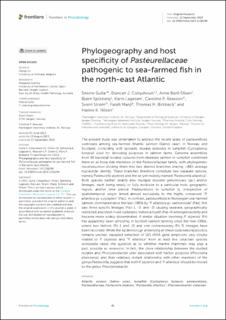| dc.contributor.author | Gulla, Snorre | |
| dc.contributor.author | Colquhoun, Duncan John | |
| dc.contributor.author | Olsen, Anne Berit | |
| dc.contributor.author | Spilsberg, Bjørn | |
| dc.contributor.author | Lagesen, Karin | |
| dc.contributor.author | Åkesson, Caroline Piercey | |
| dc.contributor.author | Strøm, Sverri | |
| dc.contributor.author | Manji, Farah | |
| dc.contributor.author | Birkbeck, T.H. | |
| dc.contributor.author | Nilsen, Hanne Katrine | |
| dc.date.accessioned | 2024-03-11T10:15:10Z | |
| dc.date.available | 2024-03-11T10:15:10Z | |
| dc.date.created | 2023-10-10T10:03:26Z | |
| dc.date.issued | 2023 | |
| dc.identifier.issn | 1664-302X | |
| dc.identifier.uri | https://hdl.handle.net/11250/3121761 | |
| dc.description.abstract | The present study was undertaken to address the recent spate of pasteurellosis outbreaks among sea-farmed Atlantic salmon (Salmo salar) in Norway and Scotland, coinciding with sporadic disease episodes in lumpfish (Cyclopterus lumpus) used for delousing purposes in salmon farms. Genome assemblies from 86 bacterial isolates cultured from diseased salmon or lumpfish confirmed them all as bona fide members of the Pasteurellaceae family, with phylogenetic reconstruction dividing them into two distinct branches sharing <88% average nucleotide identity. These branches therefore constitute two separate species, namely Pasteurella skyensis and the as-yet invalidly named “Pasteurella atlantica”. Both species further stratify into multiple discrete genomovars (gv.) and/or lineages, each being nearly or fully exclusive to a particular host, geographic region, and/or time period. Pasteurellosis in lumpfish is, irrespective of spatiotemporal origin, linked almost exclusively to the highly conserved “P. atlantica gv. cyclopteri” (Pac). In contrast, pasteurellosis in Norwegian sea-farmed salmon, dominated since the late-1980s by “P. atlantica gv. salmonicida” (Pas), first saw three specific lineages (Pas-1, -2, and -3) causing separate, geographically restricted, and short-lived outbreaks, before a fourth (Pas-4) emerged recently and became more widely disseminated. A similar situation involving P. skyensis (Ps) has apparently been unfolding in Scottish salmon farming since the mid-1990s, where two historic (Ps-1 and -2) and one contemporary (Ps-3) lineages have been recorded. While the epidemiology underlying all these outbreaks/epizootics remains unclear, repeated detection of 16S rRNA gene amplicons very closely related to P. skyensis and “P. atlantica” from at least five cetacean species worldwide raises the question as to whether marine mammals may play a part, possibly as reservoirs. In fact, the close relationship between the studied isolates and Phocoenobacter uteri associated with harbor porpoise (Phocoena phocoena), and their relatively distant relationship with other members of the genus Pasteurella, suggests that both P. skyensis and “P. atlantica” should be moved to the genus Phocoenobacter. | en_US |
| dc.language.iso | eng | en_US |
| dc.publisher | Frontiers | en_US |
| dc.rights | Navngivelse 4.0 Internasjonal | * |
| dc.rights.uri | http://creativecommons.org/licenses/by/4.0/deed.no | * |
| dc.title | Phylogeography and host specificity of Pasteurellaceae pathogenic to sea-farmed fish in the north-east Atlantic | en_US |
| dc.type | Journal article | en_US |
| dc.type | Peer reviewed | en_US |
| dc.description.version | publishedVersion | en_US |
| dc.rights.holder | Copyright 2023 The Author(s) | en_US |
| dc.source.articlenumber | 1236290 | en_US |
| cristin.ispublished | true | |
| cristin.fulltext | original | |
| cristin.qualitycode | 2 | |
| dc.identifier.doi | 10.3389/fmicb.2023.1236290 | |
| dc.identifier.cristin | 2183185 | |
| dc.source.journal | Frontiers in Microbiology | en_US |
| dc.relation.project | Fiskeri- og havbruksnæringens forskningsfinansiering: 901680 | en_US |
| dc.subject.nsi | VDP::Basale medisinske, odontologiske og veterinærmedisinske fag: 710 | en_US |
| dc.subject.nsi | VDP::Basic medical, dental and veterinary sciences: 710 | en_US |
| dc.identifier.citation | Frontiers in Microbiology. 2023, 14, 1236290. | en_US |
| dc.source.volume | 14 | en_US |

